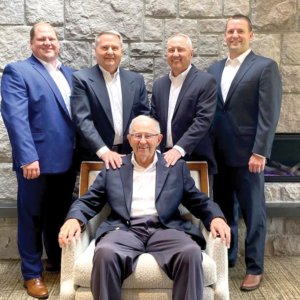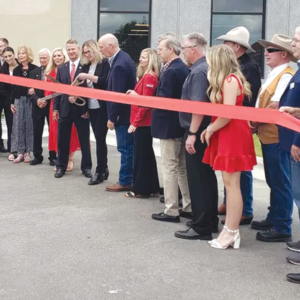By Evelyn Pyburn
Although NorthWestern Energy’s Yellowstone County Generating Station is going through final performance testing, it is in full operation and serving customers. A group of media folks were given a tour last week, accompanied by several company representatives, including Josh Follman, the generating station’s project manager and Director of Project Development for NorthWestern Energy (NWE).
The new $310 million generating station is comprised of 18 reciprocating internal combustion engines that are capable of generating a total of 175 megawatts, which helps close the gap of the generation needs for NWE’s customers in Montana. The generating station is located next to the CHS Refinery at Laurel at the end of South Strauch Road, just off the South Frontage Road.
Follman declared the plant as “very good, very clean.” It is “One of the cleanest facilities because of its emissions profile.” According to Follman, the company does not have to monitor for emissions because their emissions are “far below the levels set to initiate controls. The plant is equipped with emission monitors that continuously take readings, and are programmed to “kick itself off” should emissions reach unacceptable levels. Because of its low emissions, NWE is only required to submit reports to the Environmental Protection Agency (EPA), annually.
NWE pushed to complete the generating station as quickly as possible in order to circumvent the frequent need to purchase energy from the market when it lacks the energy needed to meet peak demand periods. “If we don’t have enough of our own, we go to the market and have to purchase energy at a very high price,” said Follman, adding, “The worst that we have to do is buy energy.”
Over the past few years NWE has had to spend about $5 million each year purchasing energy from the market to meet peak use demands.
In a recent interview, NWE President and CEO Brian Bird said the production of the Yellowstone County Generating Plant will cut in half the additional power that NWE needs, but they won’t have all they need until NWE acquires ownership of Colstrip Units 3 & 4 at the beginning of next year.
One-third of the power – about 450 megawatts — that NorthWestern Energy provides to the state is consumed in the Billings area.
Yellowstone County Generating Station also serves as back up when the wind doesn’t blow and the sun doesn’t shine, to power alternative generating facilities, which could again force NWE to buy from the market. “On very cold winter days we usually have no wind in Montana, and at night, no sun,” said Follman.
The new facility makes it possible to quickly respond to rapid changes in energy availability. Supply is constantly monitored and should the wind suddenly quit blowing at a wind facility, or some other sudden change occur, a generator or multiple generators may be started into production in three minutes, producing energy on the grid in eight minutes.
“They will chase the wind faster than a gas turbine,” said Follman.
A beauty of the new facility is that not only does it not have to be constantly running, but they can engage as few or as many generators as is needed to meet any given situation.
Completion of the generating station will also allow NWE to do more research, said Follman. “We now have a backstop. It is a big part of the operation.”
The technology involved in the generating plant is not new. It’s been around “forever” according to Follman, although “the technology has gotten better” over time. It has, in fact, long been used by the US Navy, which must operate power plants on their ships. That is the background from which Follman comes. Originally from Anaconda, Follman said he didn’t realize the potential prospects that awaited him when he was learning about power generation in the Navy. He has since pursued a career building power plants for companies across the country; his most recent being in Heron, South Dakota.
Follman explained that the technology involved in the Yellowstone County Generation Station is essentially that of a car engine. “…the main difference between a typical car engine and this is size.”
The plant is a very simple, basic concept. It’s so simple it is often referred to as a “stupid plant“ – “it’s gas in, power out,” said Follman.
The fuel used is different from that used in a vehicle, of course. Rather than gasoline they use natural gas which is considered one of cleanest forms of carbon fuels. Otherwise the generators are every bit like an automobile engine except that they are so much larger. Typically a car engine is understood to be a 6V or 8V, but these engines are a 20V. Otherwise, they function just like an automobile engine from catalytic converters to radiators.
Follman explained how the monstrous generators were transported and put into place, in the 400 foot long building. Rails were laid in the building and a crane would lift a generator and put it on the rails. For a lubricant to slide the generator to its permanent placement they used Dawn liquid dish soap – apple scented.
Installation of the generators required 86.5 miles of cable.
They are designed to have a life span of more than 30 years, some have been running for 50 years.
Everything that happens at the Yellowstone Generating Station is constantly monitored from the basic control room which is equipped with video monitors and computer data, conveying a constant flow of information to two people who are always on duty. The entire facility is operated by a small staff – two people in the control room plus a maintenance crew. The station has a total of 20 employs, 90 percent from the local area.
The O & M Supervisor for the Yellowstone Generating Station is Joe Janecek from Columbus.
Operators must keep the generators at a temperature of 100 degrees for best functionality. Keeping them at that temperature means that the building they are in is always quite warm. The roof of the building is devised to allow excess heat to escape.
The natural gas used by the facility is piped from Colorado under the Yellowstone River. The natural gas is piped under 125 psi (pressure per square inch) to each of the 18 reciprocating internal combustion engines, which were built by Caterpillar in Germany.
The only water used by the plant is obtained from wells and there is “zero water discharge,” said Follman. Water is only used for an eye wash station, for toilets and a sink in the control room.
Much focus was placed on keeping the noise level as low as possible. Also, the lighting is “dark-sky friendly,” with lights focused downward designed to have a minimal impact on the surrounding area.
The noise level inside the plant when the generators are running can be very loud. Follman likened it to a Van Halen concert. Given the level of noise, construction of the station incorporated a lot of sound –dampening measures, including baffles in the narrowest top portion of the nine distinctive silos that rise above the plant.
Now, Follman has a standing challenge to anyone to identify from outside, if a generator is running, which one it is. He will buy the beer, he says. Follman said that the decibel level of the plant is about 65 which is about the decibel level inside a restaurant.
If power to the facility is lost for any reason it has a backup battery that lasts for eight hours. Follman seemed unable to imagine any situation in which the eight hours back up would not be enough, but if for some reason it is needed, they also have a generator.
Given that adversaries of the development of the plant have challenged the project based upon issues pertaining to zoning, questions were asked about why NorthWestern Energy chose that location. Jo Dee Black, NWE Public Relations Specialist, explained that the location had most of the requirements needed for the facility’s operation including being able to bring in the natural gas needed and being in close proximity to a NWE substation.
Black said that the allowable land uses for the site, which is partly zoned Heavy Industrial and partly Agriculture, was conducive to a power plant, and she noted that the surrounding land uses were appropriate in that they include the waste water treatment plant for Laurel and the CHS refinery, from whom NWE purchased the property.
A court case was filed by those objecting to NWE plans for the Yellowstone County Generating Station challenging the county’s authority to zone that area. The case was brought by Northern Plains Resource Council (NPRC), the Montana Environmental Information Center (MEIC), and Thiel Road Coalition, in an effort to halt construction of the station.
Earlier this year, District Court Judge Jessica Fehr, determined that the county has full authority to establish the zoning, which it has always exercised over unincorporated areas and areas outside municipal boundaries. The Judge said that, according to state law, cities can exercise “extraterritorial jurisdiction” on land near a city boundary, but that authority ends once a county has adopted zoning or subdivision regulations, which Yellowstone County has done.
Plaintiffs in the case, opposed to the plant’s construction, claim it will generate air pollution and pose an environmental threat to the Yellowstone River.
Some of the confusion and controversy surrounds the fact that the initial documents approved by county administrators at the time of adoption in 1979 cannot be found. A few weeks ago, Yellowstone County Commissioners went through the formal process of re-adopting the original zoning regulations, based upon replications of data and maps, and many years of recorded data that has been accepted by city and county planners.
While the commissioners’ action did not affect in any way the existing zoning, many representatives of those living near the newly completed facility attended the commissioners’ meeting expressing doubt about the validity of the county’s claim that the original documents were lost, and reciting concerns about pollution, risks to the Yellowstone River and impacts to the neighborhood including very loud noises when the station is running.
Earlier this year, the City of Laurel completed a Growth Policy, which was approved by the County Commissioners. A Growth Policy is meant for planning purposes and is not a regulatory document.
Any zone change requests must be made by the owner of the property.
Even though NWE gained all state approvals, including those of EPA and DEQ, to build the $310 million plant, which is now completed, NPRC and MEIC continue to pursue legal action in the quest to require dismantling it.








